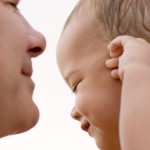Op/Ed By Kimberly Lord Stewart, editor Today’s Practitioner / At a YMCA board meeting with visiting guests from our local school board, the topic was early childhood development and narrowing the achievement gap for preschoolers. In our community alone there are at least 700 children who are not prepared to start school. The solution was something our school board calls small talk. It’s not a complicated system of education preparedness, it’s simply talking to infants in full sentences from birth to age three. Brilliant idea.

By the time an at-risk child reaches age three, it’s too late. The dendrites and nerve cells that set us up for successful learning are already in place, which means a lot of verbal interaction needs to happen from birth to three years. Television won’t do as there is no direct eye contact and conversation.
At the time, I had only been a grandmother for a week, but I was keenly aware there was a big gap in overcoming this achievement gap. Schools do not teach infants. I asked the obvious, ‘Who should get this message to parents?’ The answer: doctors and medical professionals.
Since family doctors, nurse practitioners and care providers often have the most influence with parents of infants during well-baby check ups and these early years, your practice could be the first place these parents hear the message, “Please talk to your children, in full sentences and with expressive eye contact.
Are you prepared to teach parents why talking to babies is more than babbling and baby talk?
In case you need some back up, here is a primer (based on a recent clinical study), on how to teach parents to talk to their infants.
Why should parents talk to their infant children?
New research from Northwestern University demonstrates that even before infants begin to talk in sentences, they are paying careful attention to the way a new word is used in conversations, and they learn new words from this information in sentences.
For example, if you take an infant to the zoo and say, “Look at the gorilla” while pointing at the cage, the infant may not know what exactly is being referred to. However, if you say, “Look! The gorilla is eating,” the infant can use the word that they do know – “eating” – to conclude that “gorilla” must refer to the animal and not, for example, the swing she is sitting on.
Study results on talking and childhood development
The zoo scenario mirrors the method the researchers used for their experiment. First, infants at ages 15 and 19 months were shown several pairs of pictures on a large screen. Each pair included one new kind of animal and a non-living object. Next, the objects disappeared from view and infants overheard a conversation that included a new word, “blick.” Finally, the two objects re-appeared, and infants heard, for example, “Look at the blick.”
“After overhearing this new word in conversation, infants who hear a helpful sentence such as ‘the blick is eating’ should look more towards the animal than the other, non-living object,” said Brock Ferguson, a doctoral candidate in psychology at Northwestern and lead author of the study. “We show that by 19 months, they do just that. In contrast, if infants heard the new word in an unhelpful sentence such as ‘the blick is over here’ during the conversation, they don’t focus specifically on the animal because, after all, in this kind of sentence, ‘blick’ could mean anything.”
When learning begins
The researchers said many people believe that word learning occurs only in clear teaching conditions — for example, when someone picks up an object, brings it to the baby, points to it and says its name. In fact, infants usually hear a new word for the first time under much more natural and complex circumstances such as the zoo example described.
“What’s remarkable is that infants learned so much from hearing the conversation alone,” said Sandra Waxman, senior author of the study, the Louis W. Menk Professor of Psychology in the Weinberg College of Arts and Sciences and faculty fellow at the Institute for Policy Research at Northwestern. “This shows how attuned even very young infants are to the conversation around them. It also shows how well infants build upon what they do know to build their vocabulary.”
Why this is significant
Ferguson said that this study underscores that the amount of language a child hears on a daily basis can have significant consequences on their language outcomes later in life. “One implication of our new study is that infants who hear relatively little language in the first few years may also be missing out on critical word learning opportunities that arise everyday in the conversations that surround them,” said Ferguson.
He said future research includes examining the link between language input, processing efficiency and the kind of word learning revealed in the study to better understand how to best support children’s language development from a very early age.





